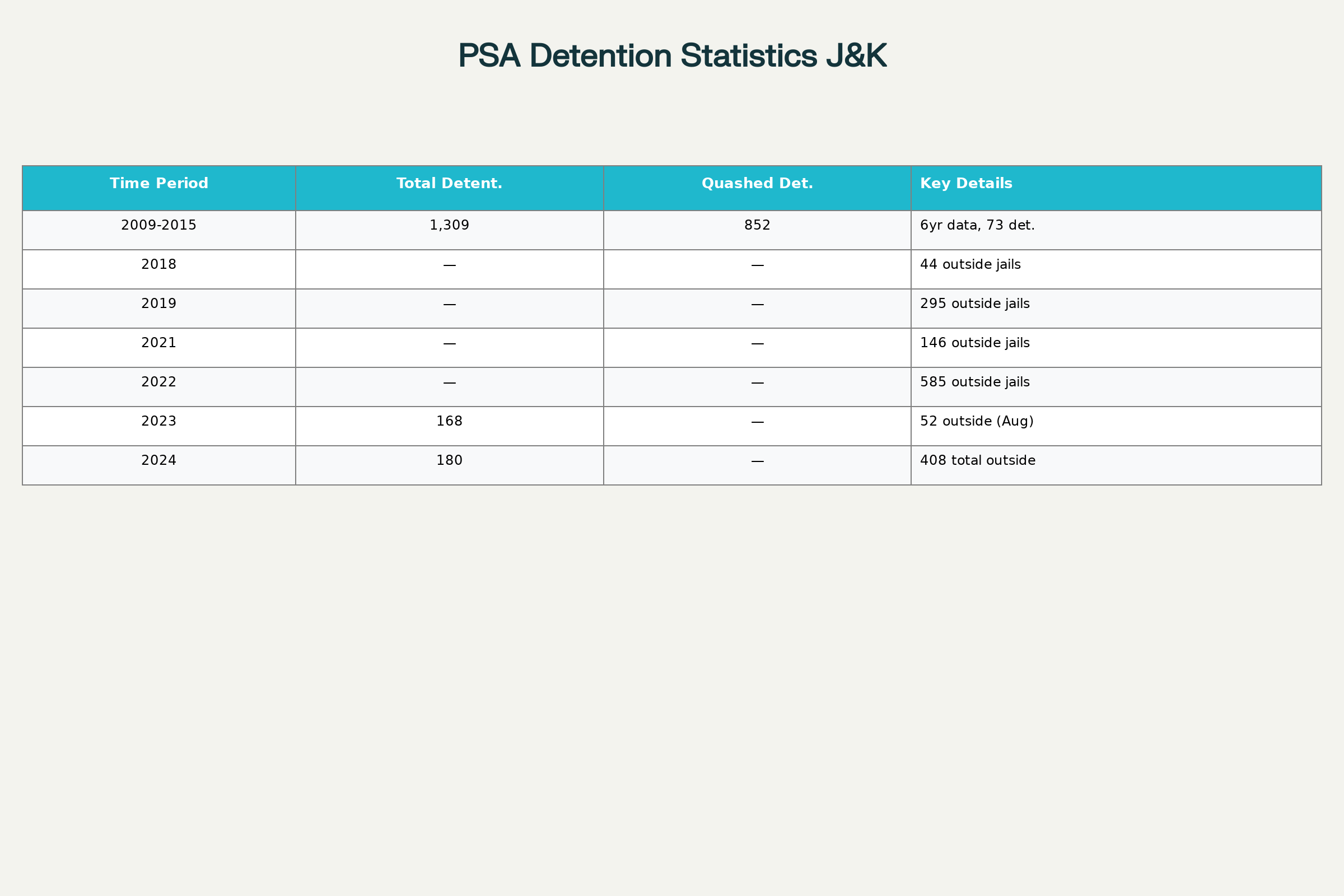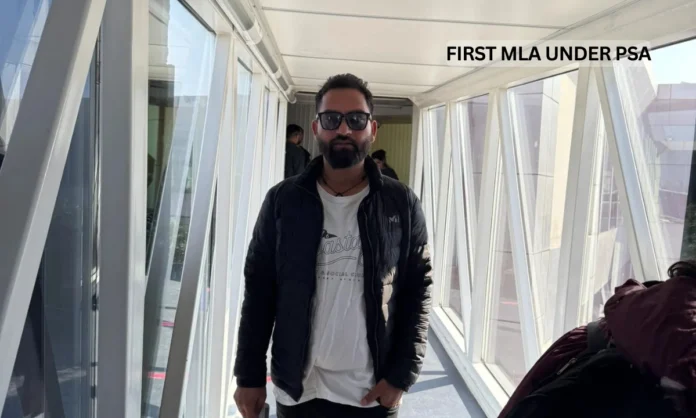Key Highlights:
- Jammu And Kashmir Public Safety Act invoked against sitting MLA for first time since 1978 enactment
- District magistrate’s 33-page dossier details 18 cases against Malik under Jammu Kashmir And Public Safety Act provisions
- Malik’s detention under Jammu And Kashmir Public Safety Act triggers massive protests and curfew restrictions in Doda
Opening Overview
The invocation of the Jammu And Kashmir Public Safety Act against Aam Aadmi Party’s sole legislative representative Mehraj Malik has created an unprecedented constitutional crisis in the union territory. Malik, who secured AAP‘s maiden victory in the October 2024 assembly elections by defeating BJP candidate Gajay Singh Rana with a margin of 4,538 votes, now faces detention without trial under the controversial Jammu And Kashmir Public Safety Act.
AAP के विधायक @MehrajMalikAAP पर PSA जैसी गंभीर धारा इसलिए लगाई क्योंकि उन्होंने अपने क्षेत्र में अस्पताल, स्कूल और सड़क बनाने के लिए आवाज उठाई।
— Sanjay Singh AAP (@SanjayAzadSln) September 10, 2025
मैं जम्मू कश्मीर की इस ऐतिहासिक धरती से BJP के प्रशासन को और प्रधानमंत्री जी को साफ तौर पर कहना चाहता हूं कि आप आम आदमी पार्टी को… pic.twitter.com/xd2lEYIINr
This application of the Jammu And Kashmir Public Safety Act marks the first instance of a sitting MLA being detained under this preventive legislation since its enactment in 1978, raising serious questions about democratic accountability and legislative immunity. The district magistrate of Doda, Harvinder Singh, authorized Malik’s detention under the Jammu Kashmir Public Safety Act following what authorities describe as persistent violations of public order, despite no documented incidents of violence directly attributed to the legislator’s actions.
Legislative Framework and Constitutional Provisions
The Jammu Kashmir And Public Safety Act, originally enacted in 1978 by then Chief Minister Sheikh Mohammad Abdullah to combat timber smuggling, allows authorities to detain individuals without formal charges or trial for periods extending up to two years. Under the Jammu And Kashmir Public Safety Act framework, district magistrates possess unilateral authority to issue detention orders based on police dossiers, with detainees having no right to seek bail or appoint legal representation during the initial detention period.
The Jammu And Kashmir Public Safety Act has faced widespread criticism from human rights organizations, with Amnesty International documenting a seven-fold increase in Habeas Corpus Petitions challenging detentions between 2014-2019 and 2019-2024. Recent official data reveals that the Jammu Kashmir Public Safety Act was applied to 180 individuals in 2024, representing an increase from 168 detentions in 2023, while 408 detainees under this legislation remain held in jails outside the union territory.
Political Ascendancy and Electoral Mandate
Mehraj Malik’s political journey began with his 2020 District Development Council victory in Kahara constituency, marking AAP’s first electoral breakthrough in the region where the Jammu And Kashmir Public Safety Act remains a contentious issue. The 36-year-old politician, who joined the Aam Aadmi Party in 2013, transformed from a grassroots activist into the party’s key representative in the Muslim-majority Doda constituency, frequently criticizing the misuse of laws like the Jammu And Kashmir Public Safety Act. During the October 2024 assembly elections, Malik secured 23,228 votes against BJP’s Gajay Singh Rana’s 18,690 votes, establishing AAP’s presence in its fifth state assembly amid ongoing debates about the Jammu And Kashmir Public Safety Act.
His electoral victory came despite the Doda region experiencing heightened security concerns, including recent terrorist encounters that have led to increased invocation of preventive detention laws including the Jammu And Kashmir Public Safety Act. The constituency had previously alternated between National Conference and Congress control since 1962, with both parties historically criticizing the Jammu Kashmir Public Safety Act application.results.
Detention Grounds and Administrative Rationale
The district administration’s comprehensive dossier supporting Malik’s detention under the Jammu Kashmir Public Safety Act catalogues 18 separate cases involving what officials characterize as systematic violations warranting preventive action. Central to the Jammu And Kashmir Public Safety Act application is Malik’s alleged use of Facebook to “mount verbal and derogatory attacks” on critics while disseminating what authorities term “false information” to his over 540,000 social media followers. The Jammu And Kashmir Public Safety Act detention order specifically references Malik’s confrontation with District Magistrate Harvinder Singh over compensation for a medical facility, during which the MLA allegedly used “unparliamentary language” in social media posts.
Additional grounds for the Jammub And Kashmir Public Safety Act application include threatening government officials during Operation Sindoor, violating Model Code of Conduct provisions, and allegedly encouraging young people to consume drugs to enhance their intelligence quotient. District Magistrate Singh justified invoking the Jammu And Kashmir Public Safety Act as necessary “in the best interest of society and public order” to prevent Malik from becoming “a larger threat to public safety”.
Closing Assessment and Democratic Implications
The application of the Jammu And Kashmir Public Safety Act against the union territory’s lone AAP MLA represents a critical test for democratic governance, highlighting the tension between preventive detention powers and constitutional rights of elected representatives. While the BJP has defended the Jammu And Kashmir Public Safety Act invocation as necessary for maintaining public order, opposition parties across the political spectrum, including Chief Minister Omar Abdullah, have condemned the action as undermining democratic faith.
The immediate aftermath of the Jammu And Kashmir Public Safety Act detention, including widespread protests, curfew-like restrictions, and internet shutdowns in Doda district, paradoxically demonstrates the very public disorder that the preventive legislation was meant to prevent. As AAP mobilizes legal challenges against the Jammu Kashmir Public Safety Act application through its newly formed legal team and calls for special assembly sessions, the case may ultimately determine whether preventive detention laws can be legitimately applied against sitting legislators in India’s democratic framework.

Public Safety Act Detention Statistics in Jammu and Kashmir (2009-2024)


